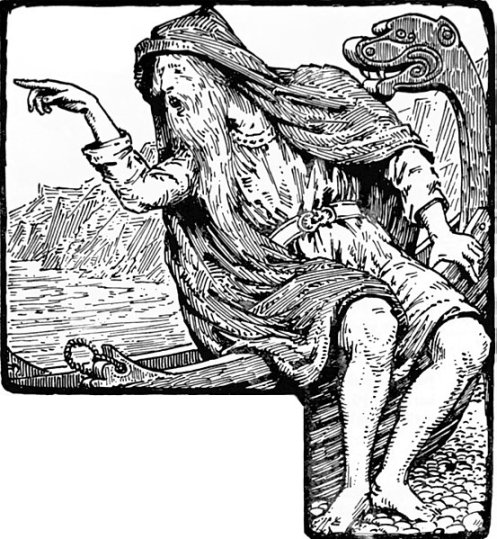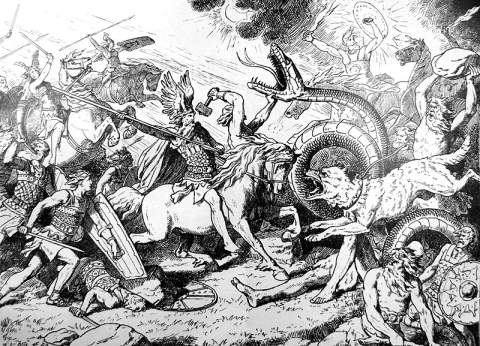One of the things I find most fascinating about Norse mythology is in fact how much we actually don’t know. There are lots of evidence found in references made that many stories have simply been lost through the passage of time. One such story to a large extent is that of the Aesir god Meili, brother to Thor.
If Thor hadn’t called himself, and been mentioned as “the brother of Meili” a couple of times, we would never have heard of him. In this article I am covering what little we know of him, and how what we don’t know also might actually tell us something.
Meili Key Facts
| Parents | Odin and possibly Jörð |
| Partners | Unknown |
| Siblings | Thor, Balder, and others |
| Offspring | None known |
| Tribe | Aesir |
| Old Norse name | Meili |
| Other names | None known |
| The God of | Possibly travel, but not specifically designated |
Name and Etymology
Meili, pronounced in Old Norse as [ˈmɛile], has been translated by some as “the lovely one.” This interpretation paints a picture of a god with a gentle or endearing nature. However, it’s not a clear cut translation, and another suggested translation is”mile-stepper.”
If this interpretation were to be considered, it might suggest a role for Meili as a Norse god of travel, overseeing journeys and wanderers. This role would sort of align with those of Hermod, at least in some regards. Together they might mirror the role and powers usually associated with Hermes from Greek mythology.
However, it’s crucial to tread with caution. These translations and the meanings derived from them are not universally recognized. They remain possibilities, open to interpretation and debate, rather than established certainties.
Meili’s Origins
Born to Odin, the Allfather, and possibly Jörð, the personification of Earth, Meili is a member of the Aesir tribe. Tracing his ancestors though is made on the assumption he shares the same as his brother Thor. We know from the Skaldskaparmál that he is the son of Odin, but his mother is not mentioned anywhere.
His lineage is nothing short of impressive, boasting a roster of brothers and half-brothers who are central figures in Norse mythology.
- Baldur: Often described as the most beloved among the gods, Baldur embodies light, purity, and beauty.
- Bragi: As the skaldic god of poetry, eloquence, and music, Bragi’s tales inspire and captivate.
- Heimdall: The ever-vigilant guardian of the Bifröst bridge, Heimdall’s keen senses make him the watchman of the gods.
- Hermod: Known for his bravery, Hermod, the messenger of the gods, undertook a perilous journey to Hel to retrieve his brother Baldur.
- Hodr: The blind god of darkness and winter, Hodr’s fate is intertwined with a tragic act that led to Baldur’s death.
- Thor: The thunder god and protector of mankind, Thor’s might is unmatched, especially when wielding his hammer, Mjölnir.
- Tyr: Representing war and justice, Tyr’s bravery shines, particularly during the binding of the wolf Fenrir.
- Vali: Born with a singular purpose—to avenge Baldur’s death—Vali stands as a symbol of swift justice and retribution.
- Vidarr: The silent god, Vidarr, is a deity of vengeance. His resilience is such that he is foretold to survive Ragnarok.
Despite being surrounded by such powerful and influential figures, details about Meili’s own exploits or early life remain scant. Having said that, I have to add that it seems obvious to me that he would have been known in the Viking Age. It seems inconcievable that they would have a god that they knew nothing about.
Meili’s Family and Relationships
Meili’s relationships, much like other aspects of his life, are shrouded in ambiguity. While his brother Thor had multiple partners and offspring, records of Meili’s personal relationships are nonexistent. This lack of information only adds to the enigma surrounding him. Furthermore, there are no known children attributed to Meili in the Norse sagas or eddas.
Meili’s Role And Depiction
Given the potential interpretation of Meili’s name as “mile-stepper,” one can’t help but wonder about his possible association with travel. The Vikings, known for their seafaring adventures and expansive explorations, would have undoubtedly understood the significance—and the perils—of travel. In such a context, it would make sense for them to seek the protection and guidance of a deity dedicated to travelers.
Drawing parallels from other ancient cultures, the Greeks revered Hermes as the god of travelers, among his many other roles. Hermes acted as a protector, guiding and watching over those on journeys. If Meili indeed held a similar role in Norse mythology, he might have been seen as a beacon for those embarking on voyages, ensuring their safe passage and return.
However, while the idea of Meili as a god of travel is intriguing, it remains speculative. The Norse sagas and eddas don’t provide explicit details about Meili’s responsibilities or roles. But, given the importance of travel in Viking life and the potential meaning of his name, it’s a possibility that adds depth to the enigma surrounding this lesser-known god.
Myths about Meili
Meili’s presence in Norse myths is subtle. Unlike many of his siblings who take center stage in epic tales and sagas, Meili often remains in the background, a silent observer. However, his existence is not entirely overlooked.

One of the few mentions of Meili comes from the Hárbarðsljóð, a poem found in the Poetic Edda. In this poem, Thor, during a verbal duel with a ferryman (who is later revealed to be Odin in disguise), proudly proclaims his lineage:
“I’ll tell you my name, | even though I’m in danger. And of my race, | I’m Othin’s son, Meili’s brother, | and Magni’s father. I’m the strongest of the gods, | you’re speaking with Thor. Now tell me your name.”
This mention, though brief, underscores Meili’s place within the pantheon of Norse gods. Being acknowledged by Thor, one of the most powerful and revered gods, speaks to Meili’s significance, even if his role remains enigmatic.
Meili’s Role in Ragnarok

Ragnarok, the cataclysmic end of the gods, saw many deities meet their fate. However, Meili’s role or fate during this apocalyptic event is not explicitly mentioned in the surviving texts. His story, like many aspects of his existence, remains one of the many mysteries of Norse mythology.
Meili In Old Norse Religion
Worship of Meili, if it existed, was not as widespread or documented as that of his more famous relatives. There are no known found artifacts or rituals dedicated solely to him.
Play Fun Norse Quiz
Is this article making you even more curious about Norse gods and goddesses? You can satisfy your curiosity by playing a fun Norse mythology quiz. This way, you can test your knowledge about Norse gods and goddesses, as well as fill in some gaps. Good luck and have fun playing!
Don’t forget to try our other games as well!
Mentions in Ancient Texts
Poetic Edda
Hárbarðsljóð
In the Poetic Edda, the poem Hárbarðsljóð stands out for its mention of Meili. This poem captures a verbal duel between Thor and a ferryman, later revealed to be Odin in disguise. Within its verses, Thor proudly acknowledges his lineage:
“I’ll tell you my name, | even though I’m in danger. And of my race, | I’m Othin’s son, Meili’s brother, | and Magni’s father. I’m the strongest of the gods, | you’re speaking with Thor.”
This mention in the Poetic Edda underscores Meili’s place within the Norse pantheon, even if his tales aren’t as extensively narrated as those of his siblings.
Prose Edda
Skáldskaparmál
The Prose Edda’s Skáldskaparmál offers multiple mentions of Meili, further emphasizing his significance in Norse mythology:
- Verses from the poem Haustlöng, attributed to the 10th-century skald Þjóðólfr of Hvinir, refer to Thor as “Meili’s brother” and also use a kenning for the god Hœnir, referring to him as “step-Meili.”
- In chapter 23, another work by Þjóðólfr of Hvinir is quoted, again acknowledging Thor’s relation to Meili.
- Finally, chapter 75 lists Meili among the names of the Æsir, placing him as a son of Odin, nestled between the gods Baldr and Víðarr.
These mentions in the Prose Edda, though brief, offer glimpses into Meili’s role and significance within the vast tapestry of Norse mythology.
Frequently Asked Questions
Meili was the son of Odin and probably Jörð.
Yes, Meili is Thor’s brother.
He was a member of the Aesir tribe.
There are no known children attributed to Meili.
His role or fate during Ragnarok is not explicitly mentioned in the surviving texts.
Featured Image Credit: Vittorio Amedeo Cignaroli, Public domain, via Wikimedia Commons

This was incredibly well done. Þórr’s only full-blooded brother (probably) is always forgotten when talking about the sons of Óðinn’s sons.
Thanks, much appreciated! Makes you think how much more or less forgotten and overlooked information is out there.